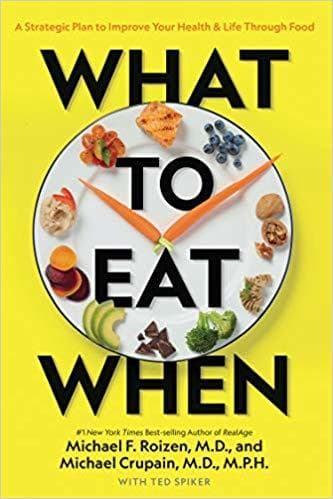
Book Review Summary: What to Eat When: A Strategic Plan to Improve Your Health and Life Through Food
Introduction
"What to Eat When: A Strategic Plan to Improve Your Health and Life Through Food" by Michael F. Roizen and Michael Crupain is a revolutionary guide that explores how the food choices we make each day can impact our health, energy, attitude, and longevity. This book is not a diet book, but rather a comprehensive guide that offers readers strategic plans to improve their health through smart food choices. The authors provide practical advice on what to eat when dealing with various situations, such as weight loss, digestive issues, stress, and more.
About Michael F. Roizen
Michael F. Roizen, MD, is a renowned physician, scientist, and author. He is the Chief Wellness Officer at the Cleveland Clinic and has been a frequent guest on television shows such as "The Dr. Oz Show." Dr. Roizen has dedicated his career to promoting healthy lifestyles and educating people about the importance of nutrition and exercise. His expertise in the field of health and wellness makes him an ideal author to write a book on strategic food choices.
Analysis of Views
- Easy to read: Many readers found the book easy to read and appreciated the broken-down chapters that allowed them to pick and choose the sections relevant to their needs.
- Practical advice: Readers appreciated the practical advice provided in the book, such as eating breakfast and lunch as the main meals and avoiding eating after 8 pm. They also found the recommendations based on scientific research to be helpful.
- Lack of new information: Some readers felt that the book did not offer any new information or insights, as many of the tips and recommendations were already known to them. They found the book repetitive and lacking in depth.
- Useful for specific situations: Readers appreciated the sections that provided advice on what to eat when dealing with specific situations, such as stress, grief, and digestive issues. These sections were seen as valuable resources for those looking for practical guidance.
- Limited applicability: A few readers felt that the book's recommendations were too strict and not practical for their lifestyles. They found it difficult to follow some of the suggested dietary changes and felt that the authors' suggestions were too restrictive.
Reasons for Recommendation
- Practical advice: Readers found the practical advice provided in the book to be valuable and appreciated the guidance on how to make smart food choices based on specific situations.
- Useful for personalized planning: The book's broken-down chapters allowed readers to pick and choose the sections relevant to their needs, making it a useful resource for personalized planning.
- Encourages healthy habits: The authors' emphasis on making wise food choices and avoiding processed foods encouraged readers to adopt healthier habits and prioritize their well-being.
Reasons for Not Recommendation
- Repetitive content: Some readers felt that the book lacked new information and was repetitive in its content, making it less engaging and less valuable. They felt that the book could have been more concise and focused on presenting new insights.
- Limited applicability: A few readers found the book's recommendations too restrictive and not practical for their lifestyles. They felt that the authors' suggestions were too strict and difficult to follow, making it challenging to implement the strategies outlined in the book.
Conclusion
"What to Eat When: A Strategic Plan to Improve Your Health and Life Through Food" by Michael F. Roizen and Michael Crupain offers practical advice on how food choices can impact our health, energy, attitude, and longevity. While some readers found the book repetitive and lacking in new insights, others appreciated the practical guidance provided on specific situations such as weight loss, stress management, and digestive issues. The book encourages readers to make wise food choices based on scientific research and promotes healthy habits for overall well-being. However, its recommendations may not be suitable for everyone, particularly those who find them too restrictive or difficult to implement in their daily lives. Overall, "What to Eat When" serves as a valuable resource for those seeking strategic plans to improve their health through smart food choices.